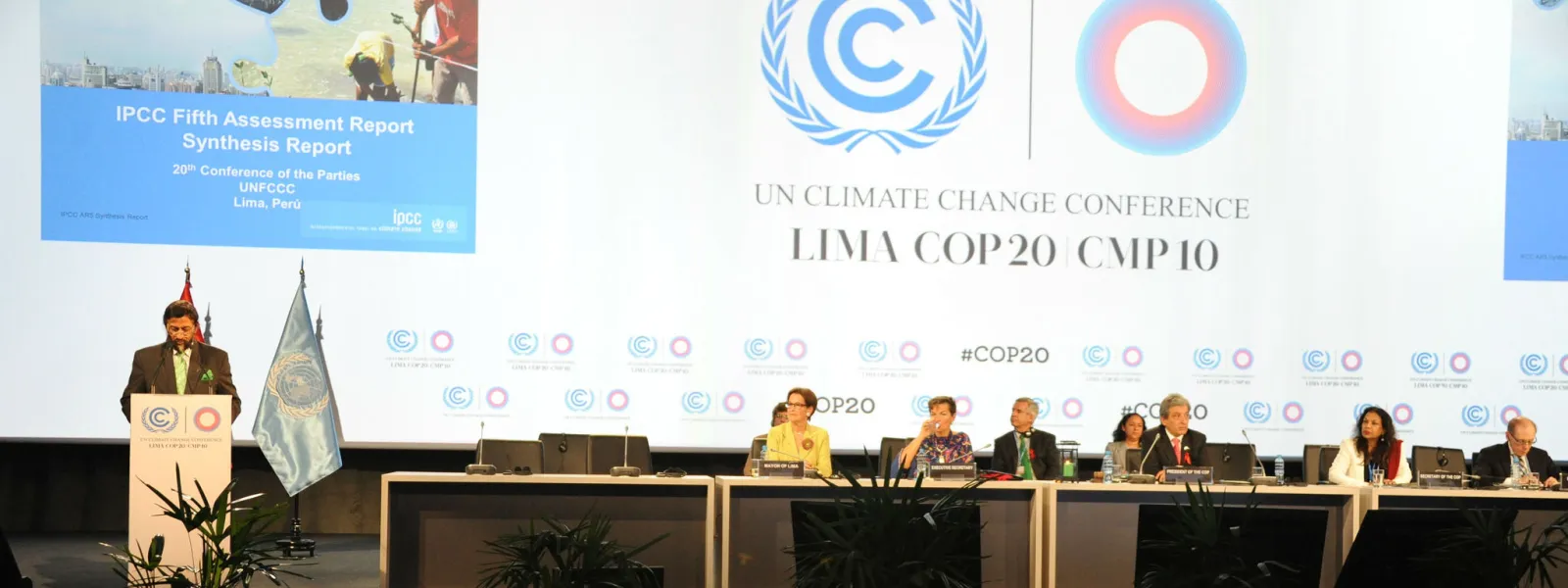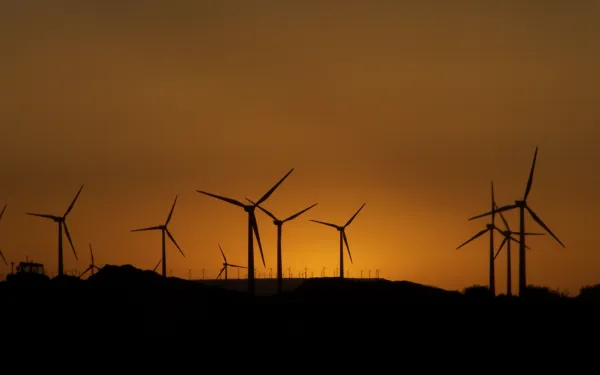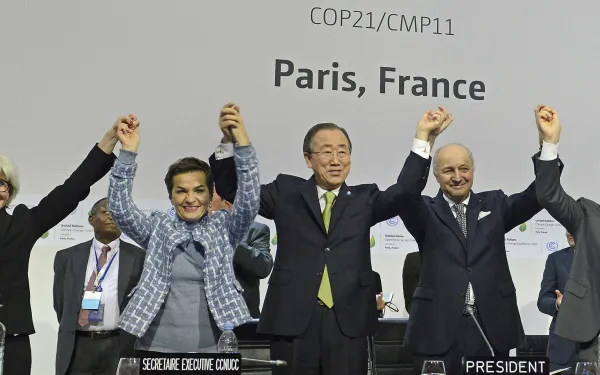
Project
Photo: UNFCCCMonitoring the UN Climate Negotiations
As changes in climate become more extreme, their affects are being hardest felt throughout developing countries. Since 1994, the United Nations Framework Convention on Climate Change has laid out actions to limit the increase of global average temperatures and confront the impacts of climate change.
The States that are Parties to the Convention meet every year in the so-called Conference of the Parties (COP) to review their commitments, the progress made in fulfilling them, and pending challenges in the global fight against the climate crisis.
At COP21 in 2015, they adopted the Paris Agreement, which seeks to strengthen the global response to the climate emergency, establishing a common framework for all countries to work on the basis of their capacities and through the presentation of Nationally Determined Contributions (NDC) that will:
- Limit the increase in global temperatures to 2°C compared to pre-industrial levels and continue efforts to limit it to 1.5°C;
- Increase the capacity of countries to adapt to the impacts of climate change; and
- Ensure that financing responds to the goal of reducing greenhouse gas emissions.
Our focus areas
THE CLIMATE CRISIS AND HUMAN RIGHTS
The climate crisis, due to its transversal character, has repercussions in various fields, geographies, contexts and people. In this regard, the Preamble to the Paris Agreement states that it is the obligation of States to "respect, promote and fulfill their respective obligations on human rights, the right to health, the rights of indigenous peoples, local communities, migrants, children, persons with disabilities and people in vulnerable situations and the right to development, as well as gender equality, the empowerment of women and intergenerational equity."
AIDA at the COP
COP25: Chile-Madrid 2019
At COP25 in Madrid, Spain, we advocated for the inclusion of the human rights perspective in various agenda items. We promoted the incorporation of broad socio-environmental safeguards in the regulation of Article 6 of the Paris Agreement, which refers to carbon markets. We closely followed the adoption of the Gender Action Plan, as well as the Santiago Network, created "to catalyze technical assistance […] in developing countries that are particularly vulnerable to the adverse affects of climate change." We also encouraged the inclusion of ambitious and measurable targets for the reduction of short-lived climate pollutants in the climate commitments of States.
Related projects
Latest News

As US withdraws from Paris Climate Agreement, Latin America must step up
Without US participation, other countries must urgently limit greenhouse gas emissions. Now that President Donald Trump has withdrawn the United States from the Paris Climate Agreement, Latin American nations must act with new urgency to combat global climate change. In a blow to the Paris Agreement, Trump’s move sends a message that the U.S. federal government is no longer committed to curbing greenhouse gas emissions. The United States, Syria, and Nicaragua are now the only nations that refuse to join the historic fight against global warming. The Paris Agreement, which directs countries to set targets for the reduction of greenhouse gas emissions, was hailed as the first truly global climate deal to curb climate change. “This has huge implications for the Global South in the fight against climate change,” said Astrid Puentes, Co-Executive Director of the Interamerican Association for Environmental Defense, or AIDA. “We can no longer rely on the U.S. government to set an example for climate progress. Now more than ever, it’s important that Latin American countries step up efforts to curb their greenhouse gas emissions.” Although the United States and China are the largest emitters of greenhouse gases, nine percent of total global emissions come from Latin America, according to the UN Economic Commission on Latin America and the Caribbean. “In a region with immense ecological diversity, Latin America has an opportunity to take a leadership role in protecting natural resources and communities by shaping a clean energy future without reliance on fossil fuels,” Puentes said. “Without the United States, Latin America now needs to lead the global fight against climate change, and AIDA will continue to be at the forefront of that fight.” AIDA has worked with Latin American governments to increase their capacity to secure international funding for climate projects, raised awareness that many dam reservoirs emit significant amounts of methane, built a regional effort to counter the spread of hydraulic fracturing projects, and helped to protect critical carbon sinks, among other projects. As a team of environmental and legal experts, AIDA also works to protect the human rights of people and their communities throughout Latin America. AIDA is the only regional organization in Latin America that provides free legal support to communities and organizations dedicated to protecting human rights and the environment. Press contact: Astrid Puentes Riaño, Executive Co-Director, [email protected]
Read more
AIDA statement on the signing of the Paris Accord
AIDA celebrates the first step toward the construction of a new planet. New York, USA. Today, on Earth Day, in the headquarters of the United Nations, the Paris Agreement opens for signatures. The signing of the accord by Member States of the UN Framework Convention on Climate Change is necessary to enable the treaty to quickly enter into force. The agreement lays out actions the world must implement to tackle climate change, the greatest threat humanity faces. The following is a statement by AIDA co-directors Astrid Puentes Riaño and Anna Cederstav: “Today we celebrate the historic signing of the Paris Agreement, a vital step and a new beginning in humanity’s efforts to tackle climate change. This accord, and its immediate signing and ratification by all nations, brings hope to our planet and for future generations. We recognize that the Agreement is not perfect, but we understand the complexity of nearly 200 countries reaching consensus on sensitive issues. The agreement is therefore a critical first step on the path toward ambitious and effective results. One of the Agreement’s noteworthy advances is the recognition that all climate actions must take into account and respect human rights and the rights of indigenous peoples, while also ensuring gender and intergenerational equality and a just transition of the workforce. The Agreement also recognizes the large gap that exists between the commitments made by States and the urgent measures needed to avoid catastrophic consequences, including the need for increased climate finance. We therefore hope that the celebration, speeches and official photographs will translate into prompt and effective action that goes beyond the agreements made in Paris last December. The Paris Agreement reflects a paradigm shift that is both necessary and possible. For Latin America and the Caribbean, highly affected and vulnerable regions, the Agreement presents a unique opportunity to achieve low-carbon development that prioritizes the protection of communities, people and ecosystems. AIDA has participated in the climate negotiations for many years as a Latin American voice. It makes us proud that our efforts, alongside those of the countless people and organizations with whom we’ve worked, have come to bear fruit. The signing of the Agreement today commits us to continuing our work to ensure compliance. Responding to climate change is everybody’s job, considering differentiated capabilities and responsibilities. States have an obligation to sign, ratify and immediately implement the Paris Agreement. International organizations, financial institutions and corporations must acknowledge their responsibility. And we, as individuals, must all examine our personal actions and how we can contribute to reducing climate change. Each and every contribution is essential to the adoption of real solutions that lead the way to a more just and sustainable world. The signing of the Paris Agreement today evidences important political will that must be translated, without delay, into concrete results. The most vulnerable and most severely affected countries cannot wait.”
Read moreCOP21: Mainstreaming Climate Change within Financial Institutions
Financial institutions are crucial players in the global fight against climate change. In order for countries around the world to successfully pursue low-carbon and climate-resilient development, significant sums of finance will need to be harnessed. The Paris Agreement – set to be finalized this week at the close of COP21 – will surely catalyze climate finance around the world. But climate finance will only represent a small percentage of overall global financial flows. Therefore, the extent to which climate change considerations are more broadly mainstreamed within financial institutions will have an important effect on the speed of the global economy’s transformation in response to climate change. AIDA co-director Astrid Puentes Riaño was part of a panel that addressed this reality on December 7 during a COP21 side event titled Mainstreaming Climate Change Within Financial Institutions. The event began with a presentation unveiling the Five Voluntary Principles that had been agreed to this year by 26 financial institutions on four continents, which collectively manage $11 trillion USD. These voluntary principles included commitments to manage climate risks, improve climate performance, account for climate action, adhere to climate change strategies, and promote climate smart objectives. Following introductory remarks by the CEO of the French Development Agency and the Vice President of the World Bank Group, the main group of five panelists was invited to discuss their actions and views related to the initiative. The importance of Puentes Riaño’s presence on the panel was immediately apparent – she was not only the only woman, but also the only voice representing civil society. Other panelists included representatives from major public and private financial institutions, such as the Development Bank of Latin America, the Vicepresident of the European Investment Bank and the head of the Ministry of the Environment and Tourism in Namibia. The presentations on behalf of the financial institutions were brief, but to a certain extent heartening. Representatives lauded the billions of dollars they were committing to the fight against climate change, as well as other steps they were taking to reduce the climate impact of their investments. The European Investment Bank Representative, for example, highlighted their new emissions performance standard for investment in new energy development, which he said didn’t discriminate against any particular energy source, but effectively excluded coal. There was also discussion about the importance of working together and building information-sharing platforms, such as a website to host information gathered by the financial institutions. The representative from the commercial banking sector said that his company had committed to investing $2 billion USD in green bonds, wouldn’t be funding any new coal plants, and would be increasing investments in renewable energy. The Minister from Namibia stressed the devastating effect climate change is already having, and will continue to have, on his country. He explained that although climate change is a priority for his government, there is a lack of resources available to address the various needs that can arise at any time. Speaking on behalf of civil society, Puentes Riaño welcomed the initiative as a good start, which projected a positive image of the financial sector. Recognizing that the effort was still in its nascent stages, she offered some recommendations regarding its implementation. First, she called for consideration of human rights and social risk to be included in project assessments. This, Puentes Riaño explained, would facilitate the selection of the right kinds of projects to invest in. Secondly, she called for an effort to ensure that there was consideration of, and agreement among financial institutions about key definitions, for example “renewable energy” and “sustainable development”, as well as thought given to which options should be excluded as false solutions. Finally, she called on these funding institutions to focus on how this initiative would be implemented. She recommended having a clear, transparent, and participatory road map that was ambitious enough to put the world on a 1.5 degrees C path. During discussions like these, it’s easy to see how important it is for civil society organizations to be present and doing their best to contribute to the dialogue. In this case, AIDA was able to join the conversation and use our position at the table to help increase awareness about and advocate for access to information, transparency and accountability, public participation, and human rights.
Read more